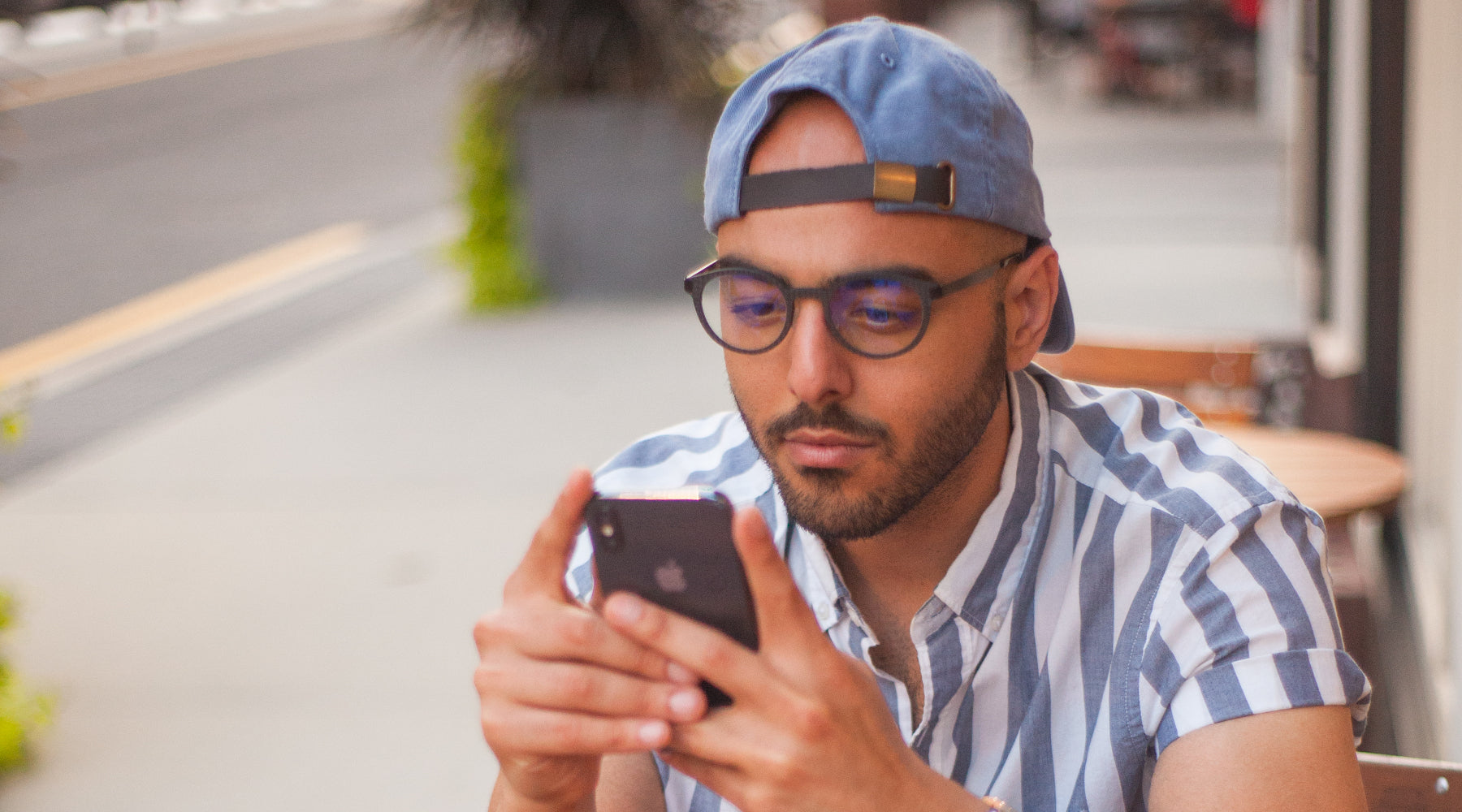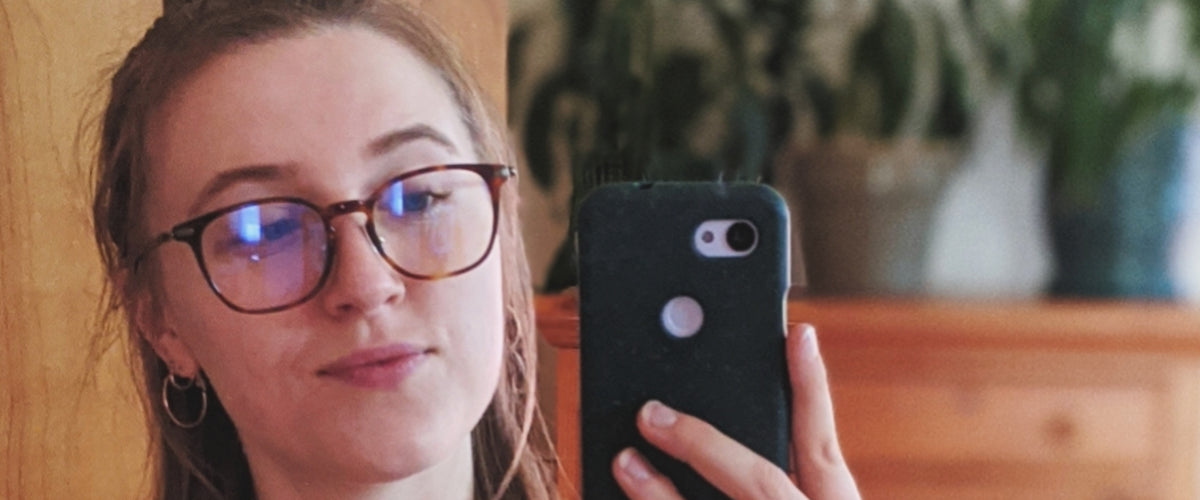Your Cart is Empty

A few weeks ago, I went to watch “The (R)evolution of Steve Jobs.” It’s an opera about the visionary behind many of Apple’s great developments. Yes, an opera about Steve Jobs is an actual thing. And it was great, too!
At the end of the opera, though, the character playing Jobs’ wife at the time of his death provided a lyrical lecture along the lines of “put your phones down and start looking people in the face.” Did it make an impact? Who knows- most people pulled their phone out and immediately took the device off airplane mode the second the curtain went down for the night.
The show was timely for me, because I’d been hit with my own version of anxiety when I misplaced my phone the week prior. I couldn’t figure out where I’d left it, on silent mode, in the house. I instantly became nervous- what texts or calls was I missing? What if something urgent came through and I missed it? It was a bad feeling that bordered on panic and it really woke me up to the dangers of smartphone and internet addiction and how all that screen time might be affecting me in ways I didn’t even realize.
Americans check their phones at least 80 times a day. Many people check their mobile phone even more often, probably losing track just in the first hour of your morning. Smartphone usage has surged in recent years and many consumers now just can’t put it down.
Maybe you’re like me and ready to put the phone down to spend more time with your family, feel less distracted, and even enjoy your life more. The problem is that you’ve become so attached to your device that it feels hard to do. Since I’ve cut quite a bit of my own screen time down in the last few weeks, here are my favorite tips.
You know how 12-step programs always emphasize that the first steps is admitting you’ve got a problem? It’s for a good reason. You might not realize how bad your addiction has gotten. Until you have a firm reason to cut down on responding to those pings, however, you’ll brush off the issue.
The real phone addiction culprit here is dopamine, which floods your body whenever you get a notification. This short burst makes it easy to reach for your devices often and to respond to their chimes or vibrations like a Pavlovian dog.
There’s no doubt that a plethora of research is emerging about how smartphones are changing our worlds and our culture. With allegedly more interconnections, there are plenty of advantages to focus on. But let’s take an honest look at some of the downsides.
Eye strain and tension is a big one, especially if you’re a knowledge worker who spends most of your day in front of the computer (Guilty as charged.) Eye strain can lead to headaches and other problems like lost focus after logging too many hours in front of a bright screen. My favorite tip is to get the most out of each session in front of a screen by staying focused and wearing blue light blocking glasses. Blue light glasses were a game-changer for me- and now I wear them anytime I’m looking at my computer or phone for a long time. Buh-bye, eye strain headaches! You can get blue light glasses in cool styles like the Hudson without any prescription to add style and subtract eye strain from your life.
Blue light, which emanates from most of the technology you spend your days parked in front of, is not a friend to your eyes or the support you need for a good night’s sleep. Some scientists argue that blue light is, in fact, the biggest barrier we face to getting a good night of rest. As constant smartphone users, we’re only making things more difficult for ourselves.
Being addicted to your cell phone also poses problems for your psychological well-being. From gaming disorder to the constant interruptions that stop your flow to the “compare and despair” you feel looking at everyone else’s highlight reel, it’s hard for everything on your phone not to creep into your life in some way. Whether it’s apps or games (RIP to the Candy Crush addiction I finally overcame) or social media, it can all start to feel like a little much.
Being neurotic already puts you in a higher risk category for feeling depressed or anxious as a result of social media. Consider taking a short-term break from the social media site or app that makes you feel that way, especially if it’s a difficult time of year for you (like summer wedding season if you’ve just been divorced or the holidays if you have tension with family members.)
Whether your phone addiction has led to information overload or compulsive behaviors, you’ll be proud of just how much you don’t need your device once you implement these tips. Take baby steps and get back your time, focus, and health. Here’s how to break that smartphone addiction.

One of the tips that made me a faster and more focused writer was working in pomodoros, which are 25 or 50 minute sprints focused on a very particular task. Combine that with focus music or binaural beats in your headphones and turn your phone upside down. You’re likely to find that you got a lot more done than you expected because you weren’t stopping to check your phone all the time. Even if you can only get through 4 or 5 pomodoros a day, these bursts of productivity are often all you need to get most of your work done.
No judgment here, but your worst enemy is you. Sometimes we have to police ourselves. One of my favorites is an app called “Cold Turkey Blocker.” It’s a Chrome extension you can install and manually enter what websites you want to block yourself from for a chosen period of time.
If you try to visit the site from your computer, you’ll get blocked. Use this in conjunction with a smartphone-friendly app like Forest, which encourages you to kick the phone-checking habit and grow virtual trees instead.
This is one of my favorite ways to just stop all the notifications. Your biggest fear is likely what would happen if someone needed to get through to you in an emergency. Start small- turn your phone on airplane mode in another room for an hour at a time. If you finish what’s in front of you, take a break and check it in the other room. Then hit airplane mode again and go back to work. You can slowly wean yourself off of constantly checking this way. And you’re likely to find that 95% of all communications are non-emergency related.
Most apps allow you to determine how many notifications you want. If you’re like me, Instagram “likes” were useless if that caused me to pick up my phone and stop what I was working on.
I even uninstalled Facebook. That means I have to re-install it every time I want to go live from my phone, and it’s a chance for me to decide how badly I really want to check social media. I also uninstalled Gmail even though I run my digital business completely through my email. I haven’t missed it at all in six weeks.
If you’re looking to break that phone addiction to spend more time with your loved ones, make a household-wide commitment to a technology-day free every single week. Sunday is a great one, and make plans instead to do things together. There’s a good chance that time will fly and that you won’t miss your phone that much anyways. Consider this digital detox a chance to interact with real people.
No matter what your reason- mental health, work productivity, or better in-person relationships, a mobile phone addiction is well worth trying to crush. Enjoy a more freeing life without mobile phone overuse.
This is a guest post by Laura Pennington. Laura is a PhD candidate, TEDx speaker, and an author with her first book coming out next summer from Entrepreneur Press.
Comments will be approved before showing up.


